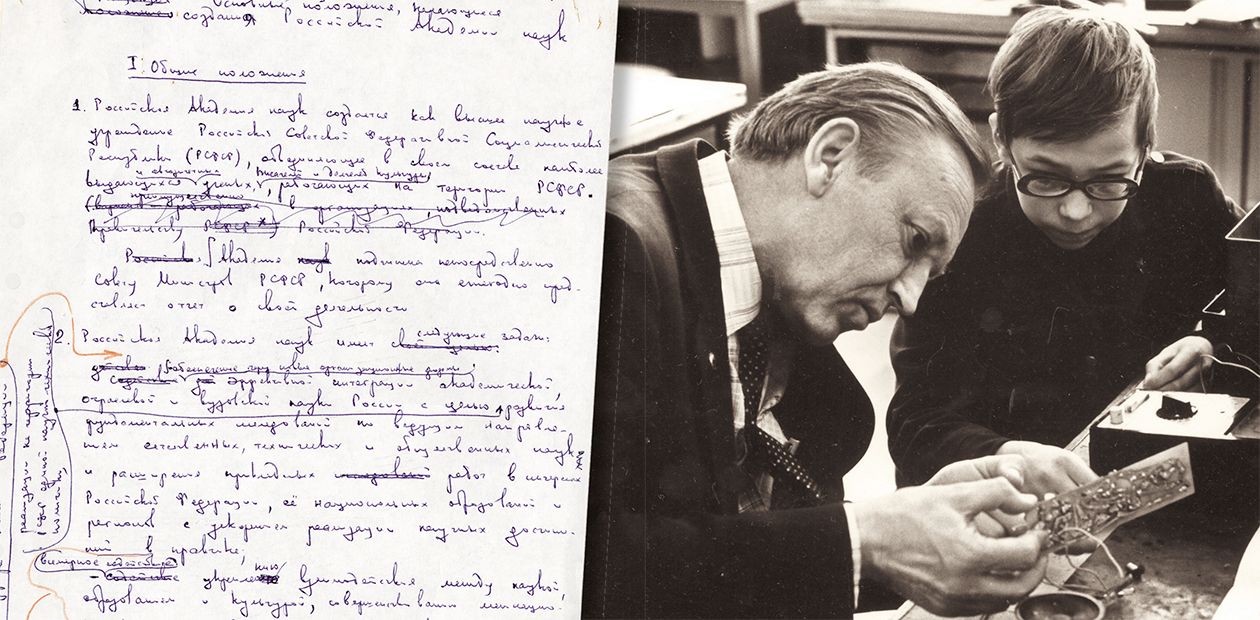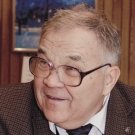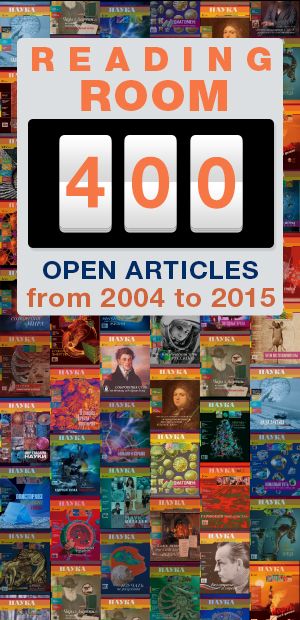Lessons from Koptyug
It is easy to write about Valentin A. Koptyug. A brilliant scientist, an excellent organizer of science, a world famous specialist in global problems of the Earth, an excellent lecturer. Even a few of these personality traits can inspire a celebratory portrait of this scientist.
At the same time, it is extremely difficult to write about Koptyug. The limits of any genre are too narrow to squeeze the description of such a multifaceted personality into them. Different sides of his extraordinary personality call for special words to describe them adequately.
The only thing that I know for sure is that it is necessary to write only the truth about Koptyug no matter how difficult it might be for some people, some of which are quite well-known
Yu.G. Demyanko, Candidate of Technical Sciences, Head of Department at Keldysh Research Center
The life of Valentin Afanasievich Koptyug is a reflection of the history of our country. A Belarussian by birth, he grew up in Smolensk, finished school in Samarkand, studied and started his working career in Moscow, and at the age of 28 became a Siberian. As he said on more than one occasion, what speaks for the person is not his nationality but what s/he does.
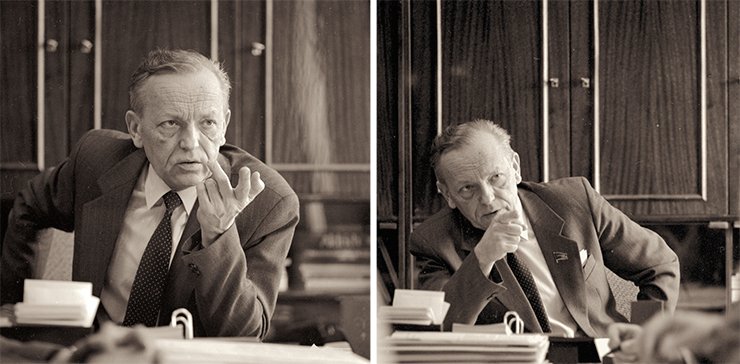
Valentin Afanasievich’s father was repressed during the Stalin era, which impacted his life first at school and then at the university. However, not only did he not become embittered but remained a patriot and a communist as well as a supporter of the socialist idea until his very end. This is a second lesson to be learned from Koptyug. It is not easy, sometimes dangerous to be an internationalist and a patriot. But if we agree that freedom is recognised necessity, then Valentin Afanasievich was a much freer man than many of our today’s leaders.
Scientist and Teacher
Valentin A. Koptyug received his higher education at the famous Mendeleev Institute of Chemical Technology. In his second-year he started doing research work; he consciously chose to do it at different departments to broaden his world outlook and deepen his general knowledge of chemistry.
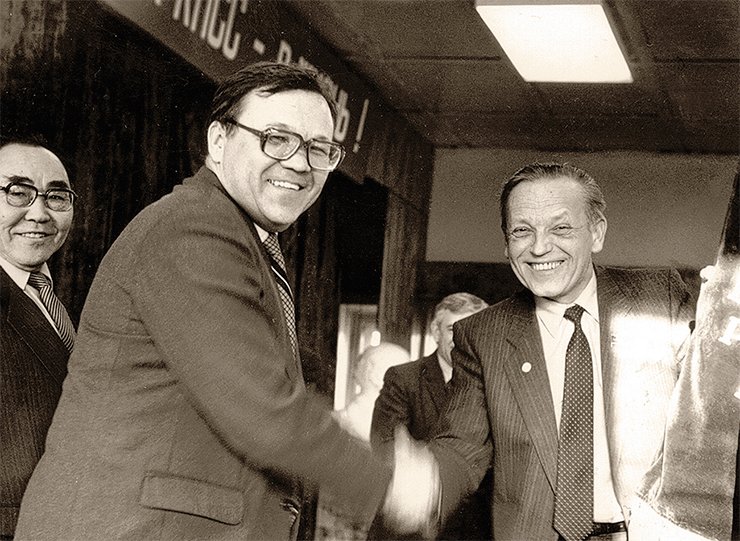
A student of an outstanding chemist Academician N. N. Vorozhtsov, Valentin Afanasievich followed his teacher to Akademgorodok after he had defended his candidate thesis. Here he began to work at the Institute of Organic Chemistry and made his way from a junior researcher to the director. He presented his doctor’s thesis at the age of 34, was elected a Corresponding Member of the Russian Academy of Sciences at the age of 37 and its Full Member (Academician) at the age of 48. Having foreseen and validated breakthrough directions in organic chemistry, Koptyug became a distinguished world authority on physical, synthetic and applied organic chemistry. He was one of the first to start introducing the newest physical methods of research, mathematical modeling and computer technologies in chemical science, thus realizing one of the fundamental principles of the SB RAS : cross-disciplinary research.
“Chemistry occupies a special place among the natural sciences thanks to an endless variety of possible objects for study. It embraces the study not only of the existing chemical world but also constantly creates such objects synthesizing new chemical compounds. The possibilities for such synthesis are limitless.”Altogether Valentin Afanasievich worked in the leading scientific organizations – the International Union of Theoretical and Applied Chemistry (IUTAC) and the Scientific Committee on Problems of the Environment (SCOPE) at the International Council of Scientific Unions – for 24 years. On his initiative, the IUTAC started realizing the program Chemistry and the Environment, organized a series of international conferences Chemical Research Applied to World Needs.
For 15 years, Valentin Afanasievich was the Chairman of the Organic Chemistry Department at Novosibirsk State University, whose hundreds of graduates work in research institutes and enterprises in Siberia. He initiated the introduction of the mathematical chemistry major at the department, when chemists had only started using new information technologies in their research studies.
At the meeting of the SB AS Presidium in Novosibirsk Akademgorodok in 1980, at which the candidates for the position of the Chairman of the Siberian Branch were nominated, several candidates were named. Among them was young Academician V. A. Koptyug, then rector of Novosibirsk State University, who stood out not only because of his outstanding scientific results but also because of his ability to tackle difficult personnel and scientific and organizational problems of functioning and development of the university, an outstanding economist Academician A. G. Aganbegyan, and others. Introducing the candidates Academician G. I. Marchuk, the former Chairman of the Siberian Branch already appointed as the Vice-President of the USSR Council of Ministers, said: “There are several deserving candidates of outstanding scientists and brilliant organizers of science. Thus it is important for us to make the right choice. Taking into account that the responsibilities of the Chairman of the Siberian Branch will require full effort on his part, we have to sacrifice one of our Academicians to the prosperity and development of the Siberian Branch, the whole scientific community in Siberia.Recommending Academician V. A. Koptyug for the position of the Chairman of the Siberian Branch, G. I. Marchuk pointed out that being familiar with his great erudition, features of character, scientific and organizational potential, he was certain that Valentin Afanasievich was capable of such sacrifice and that if he were elected the Chairman, the scientific community could be sure that it would have a first class leader.
Valentin Afanasievich’s activity as the Chairman of the Siberian Branch that followed proved this opinion to be absolutely right. He was selflessly devoted to the idea of developing science in Siberia and carried the burden of his responsibilities without taking into consideration his time and his health, always dealing with extreme overload.
Koptyug’s lectures were distinguished by such impeccable logic and deep knowledge of material that even the most complicated topics seemed to be simple and easy to understand. It is not surprising then that there were always a large number of visitors present at his lectures: researchers from different institutes, post-graduate students or people on business trips. He never gave his students bad grades, even though he was a fastidious teacher. He could formulate his questions in such a way that even a young person who was not very sure of his/her knowledge was able to give quite a satisfactory answer. Probably, Kotyug’s approach to people which manifested itself in his attempt to find each person’s good and strong features was responsible for it. He never focused on other people’s weak sides, which brought amazing results. Trying to justify his trust, people pulled themselves together, started believing in themselves and had an urge to work.
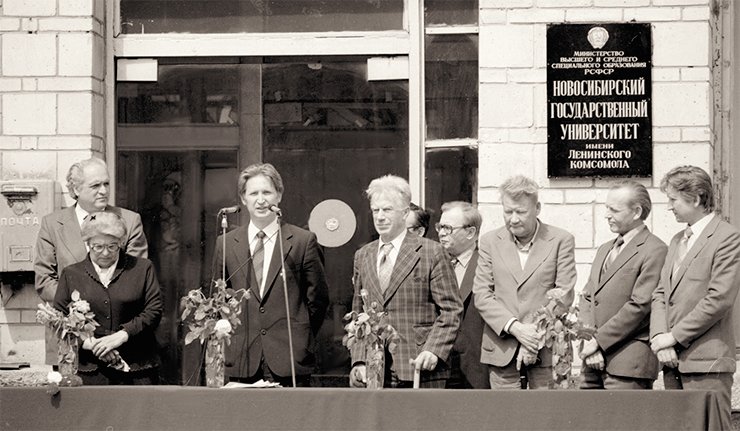
In 1978 Valentin Afanasievich was appointed as rector of Novosibirsk State University. At the session of the Ministry of Higher Education of the USSR (Minvuz USSR) he was instructed to eliminate the university’s “eccentricity,” which manifested itself in hiring a large number of part-time employees who were the leading scientists of the Academy, introducing individual course syllabi, and organising the students’ practice training at the academic institutions. But the university, together with its young rector, was able to withstand the bureaucratic pressure and did not give up on the system that was initiated by the founders of the Siberian Branch. Having become the rector, Koptyug negotiated signing an official agreement between Novosibirsk State University and the Siberian Branch USSR AS which specified their mutual commitments. He also made a considerable effort to establish and maintain relationships with the Ministry of Higher Education RSFSR. As a result, suspicious attitude to the “obstinate” university gradually became more favourable.
Leader and Creator
Koptyug was the head of the Siberian Branch of the Academy of Sciences for seventeen years, for almost the same period as it was headed by its founder Lavrentiev. He was very persistent in adhering to the strategy of priority development of fundamental science and support of the projects forming the basis for the progress in science and technology.
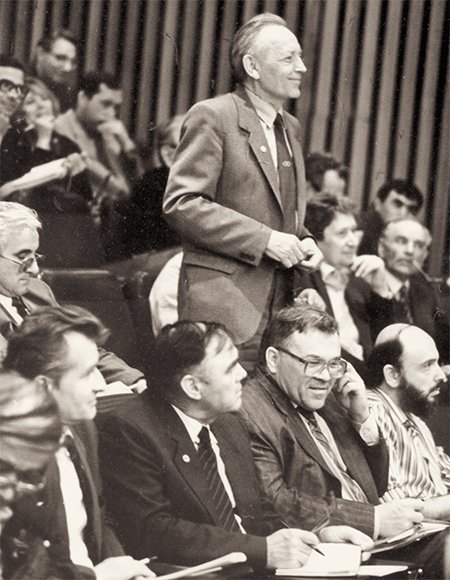 He made a considerable contribution to finishing up the construction of a network of scientific centers and institutes in SB RAS. It was not for nothing that the curve of capital investment in the Siberian Branch has two peaks: “Lavrentiev’s peak,” for the most part connected with the construction of Novosibirsk Akademgorodok in 1960—1970, and “Koptyug’s peak,” in 1987—1991, connected with the period of intensive construction in the scientific centers.
He made a considerable contribution to finishing up the construction of a network of scientific centers and institutes in SB RAS. It was not for nothing that the curve of capital investment in the Siberian Branch has two peaks: “Lavrentiev’s peak,” for the most part connected with the construction of Novosibirsk Akademgorodok in 1960—1970, and “Koptyug’s peak,” in 1987—1991, connected with the period of intensive construction in the scientific centers.
During his term as the head of the Siberian Branch, in addition to six already existing scientific centers in Novosibirsk, Tomsk, Krasnoyarsk, Buryat and Yakutsk, three more centers in Tyumen, Omsk and Kemerovo were officially recognized; new institutes were established in Barnaul, Kyzyl and Chita.
It’s necessary to add that today, on the initiative of Academician A. E. Kontorovich, the current Presidium Chairman of Kemerovo Scientific Center, a large scale construction of a real “Coal Science City” is being planned on its basis. The development of the material and scientific base of Kuzbass coal mining industry must provide for sustainable development and prosperity of the region. Without doubt, this can be considered as the continuation of “Koptyug’s line.” One of the most important directions of work in the Siberian Branch at that time was the development of an instrumental base for research studies. By means of attracting different sources of finance, numerous shared access centers were established, including the Synchrotron Radiation Center, Center for Photochemistry Research on Free Eelectron Laser, Center for Cainozoic Geochronology, Center of New Medical Technologies, etc.
“Joining the efforts of NSU and the research institutes of the Novosibirsk Scientific Centre allows us to provide a very high level of professional development for specialists with higher education. NSU is not a traditional university; it is difficult to fit its activity within the limits of existing regulations and instructions. The many departures of Novosibirsk State University from the general rule, developed for the traditional form of higher education, were determined not by the whim of its rectors but by an objective reason: our university is an important link in a well-developed multilayered training network for preparing specialists with higher education, which functions in the Novosibirsk Scientific Center but works for the whole region.”RSFSR (Ministry of Education). 1978
From 1991, there was a drastic reduction in capital investment: the situation in the country could not but influence the development of science in Siberia. Koptyug had to deal with the most difficult period in the life of the Siberian Branch, caused by the collapse of the state system and crisis situation in the national economy.
Valentin Afanasievich started a systematic restructuring of the Branch under the most difficult conditions; he charted and to a large extent realized the provisions of a new strategy for the development of academic science. It allowed for “flexible and prompt response to constantly changing conditions while preserving the most important features of the philosophy of the Branch founders: multidisciplinary nature of scientific research and its high level; focus on promoting the scientific results from the idea to their realization in the region, the country and abroad; attracting young scientists, providing the young with a high level of education and conditions for scientific research” (from V. A. Koptyug’s address to the General meeting RAS March 23, 1995).
It was under Koptyug’s leadership that a considerable shift towards democratization of the life of the academic community took place. The General Meeting of the Branch was supplemented by elected representatives of the institutes. Thus, in essence, the meeting became a two-chamber forum, with equality of votes between both chambers.
To slow down the brain drain, the Siberian Branch RAS introduced a contract payment system for the leading researchers, which increased the social security of actively working scientists. Special measures were taken to support young scientists: scholarships for postgraduate students in the amount considerably exceeding that set by the government were established; a bonus system for young Candidates and Doctors of science was introduced; financial assistance towards foreign travel cost for young scientists was provided; a housing fund for young scientists was established. It should be pointed out that at present a salary system which takes into account personal results of scientific activity is being introduced. At the same time, such system can become a trap for creative people who cannot produce one publication after another.
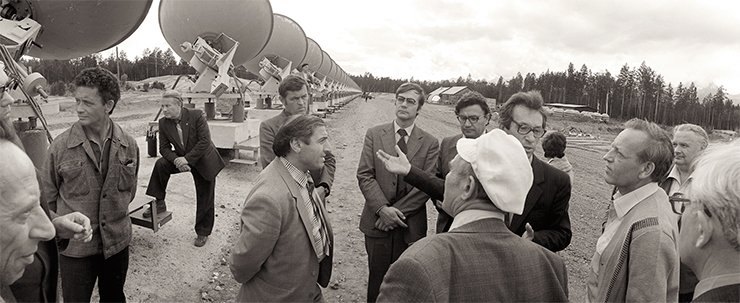
Sixteen international research centers on the basis of leading institutes of the Branch helped, to a certain extent, to withstand brain drain. They allowed Russian scientists to use advanced scientific equipment, communicate with foreign colleagues “on site,” and publish their articles in prestigious journals. Unfortunately, brain drain remains one of the unresolved problems for the Academy of Sciences. Today, the young people are very determined: if the resolution of their problems is postponed further, they will vote with their feet emigrating to the countries where conditions not only for interesting work but decent life have been created.
Politician and Reformer
At the General Meetings of the Branch, Koptyug vigorously defended his understanding of “perestroika” in the context of academic community. As a rule, his initiatives were a step ahead of the current situation and allowed the research teams not only to survive but also obtain important scientific results.
Even before the transformation of the Russian Academy of Sciences began, together with the SB RAS Presidium Koptyug initiated structural changes in the Branch. The establishment of joint institutes proved to be useful both for strengthening their position in the Academy and preventing privatization of design and engineering organizations.
A characteristic feature of regional policy to which Valentin Afanasievich adhered was close cooperation with administrations of Russian Federation subjects. He started the tradition of concluding agreements with the regions aimed at supporting science. The scientific and technical program Sibir survived only thanks to the support of the Siberian Accord Interregional Association. Work in this direction was continued by N. L. Dobretsov and A. L. Aseev, who succeeded Koptyug as Chairmen of the Branch.
Transition to market economy resulted in the collapse of the former planned system of implementing the scientific research results in industry, the establishment of which had required so much effort. However, the Siberian Branch managed to adapt to the new conditions by means of establishing small enterprises, including joint companies with foreign partners, and technoparks. The brightest example of how the policy introduced by Koptyug was realized is the development of Novosibirsk Technopark which was established on the basis of institutes in the Siberian Branch and associations formed by small enterprises from Akademgorodok together with the SB RAS. Another example is the Tomsk technology development economic zone founded with the participation of institutes of Tomsk scientific center and city universities. Time will show which model is more effective, but in any case this innovative experience will be very useful.
To protect intellectual property under the conditions of market economy, a department of economic and technical security was established, to protect the Academy’s property, a property and land use department was organized. Thanks to the establishment of these departments the Siberian Branch did not lose any large scientific site under its jurisdiction. Having regulated the procedures of renting out work spaces and developed the possible variants of participation of institutes in the activities of commercial enterprises and joint ventures, the SB RAS administration prevented uncontrolled intrusion of commercial companies in the activity of institutes.
Under conditions of limited and uncontrolled budget financing, the establishment of Sibacadembank with participation of the Siberian Branch allowed the institutes to make finance management more flexible.
Citizen and Patriot
Scientific support for environmental protection was an area of constant concern for Valentin Afanasievich. He consistently struggled against the project of Partial Flow Transfer of Northern and Siberian Rivers to the South and called attention to the problem of preserving freshwater in Lake Baikal, participated in organising comprehensive expertise for the construction of hydropower stations in Siberia and large industrial objects. He always defended his position courageously, and not only before the leaders of the country but in front of the community as well.
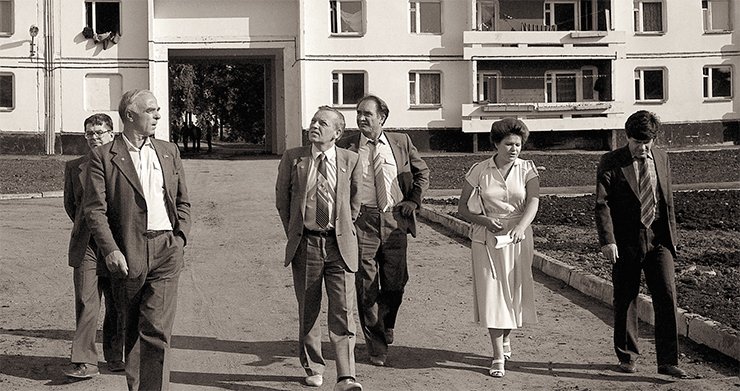
Having participated in the UNO Conference on Environment and Development in Rio de Janeiro in 1992, he became an ardent supporter and propagandist of a new paradigm for sustainable development, being at that time almost the only one in Russia.
In 1994 the UNO General Secretary Boutros Ghali invited Koptyug (the only one from Russia) to join the Sustainable Development Advisory Council. One of Koptyug’s proposals was to designate areas, in a number of countries, that could become models of sustainable development. He also proposed to make the Baikal region such a territory in Russia. As the result of intensive work carried out in the institutes of the SB RAS together with the UNESCO representatives, in 1996 Lake Baikal was included in the World Environmental Heritage List and as such recognized as not only national but international heritage.
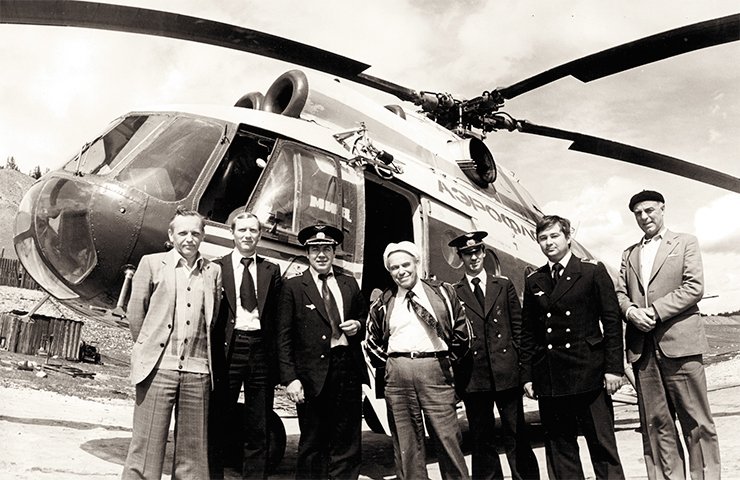
System analysis of the situation in the world presented at the UNO Conference strengthened Valentin Afanasievich’s point of view that the existing capitalist system could not be the basis for truly sustainable development of the society, without natural and social disasters. However, he also understood that the socialist system created in Russia could not be spread around the world as it was. In Koptyug’s opinion, a new model for the development of human civilization should combine the best features of socialism and civilized capitalism.
We were used to him being always there and thought it would always be this way. If necessary, he would help. We knew that he was seriously ill, but did we spare him? He works more than everybody else. It means he can, can’t he? It means he has the strength, does not it? Everybody can be wise after the event. We saw how badly he looks. We knew that Irina Fedorovna, his wife, was in despair; she could not make him undertake a proper course of treatment. Still we thought that everything was all right. We went to discuss with him our problems, both professional and personal. Once Valentin Afanasievich said that he would only work until he turned 70 and then retire. “Stop it, you will not leave!” I told him. “No, I will. Let’s make a bet on a bottle of cognac that I will leave!” “Let’s play big. Let’s bet on a monthly salary. If you leave, I will give you my pension. If you do not, you will give me your salary with all the academic bonuses.” We struck the bargain… But he did not last till 70.Being persuaded that the concept of sustainable development is in its essence socialist in nature, Valentin Afanasievich did not give up on the idea of social justice and the rule of people, remained the member of the Russian Communist Party (KPRF) and tried to do everything possible to change the nature of proposed reforms. Being a strong supporter of the socialist idea, he managed to gain a deep understanding of market mechanisms. What the leading world economists now write about the situation in Russia, academician Koptyug discussed openly and persistently from the first steps of “perestroika” in front of different audiences, including including that of the highest level.
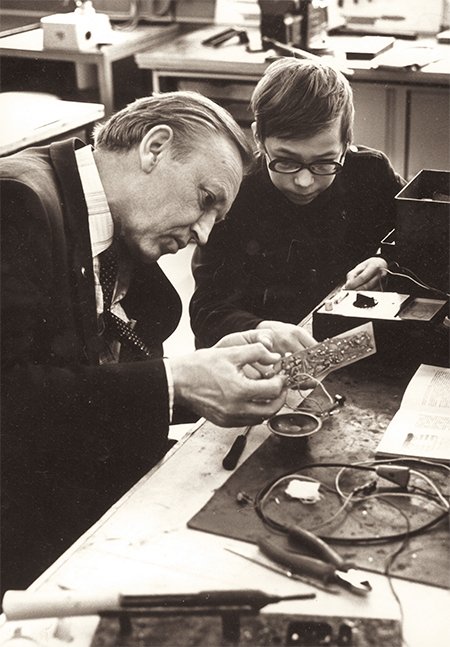 In 1995, at the meeting of the RAS Presidium, the presenters pointed out that even under very difficult crisis conditions the Siberian Branch managed to preserve its working capacity, scientific potential and efficiency. It was stressed that the SB RAS Presidium adopted a model of forward planning: Koptyug managed to resolve many questions important for the functioning of academic institutions before it was done in other branches. The president of RAS Yu. S. Osipov summed it up as follows: “I have to admit that the Siberian Branch presents a remarkable case in the system of the Academy of Sciences. Under extremely difficult conditions it managed to preserve its face, its importance not only for the Academy but the natiopnal science as a whole. The Branch has given many good examples of how it is necessary to act under present, very difficult conditions. Valentin Afanasievich, the leaders of the Branch and directors of the institutes have made a great contribution to the achievements of the Siberian Branch”.
In 1995, at the meeting of the RAS Presidium, the presenters pointed out that even under very difficult crisis conditions the Siberian Branch managed to preserve its working capacity, scientific potential and efficiency. It was stressed that the SB RAS Presidium adopted a model of forward planning: Koptyug managed to resolve many questions important for the functioning of academic institutions before it was done in other branches. The president of RAS Yu. S. Osipov summed it up as follows: “I have to admit that the Siberian Branch presents a remarkable case in the system of the Academy of Sciences. Under extremely difficult conditions it managed to preserve its face, its importance not only for the Academy but the natiopnal science as a whole. The Branch has given many good examples of how it is necessary to act under present, very difficult conditions. Valentin Afanasievich, the leaders of the Branch and directors of the institutes have made a great contribution to the achievements of the Siberian Branch”.
The last document signed by Valentin Afanasievich on 10 January 1997 were the proposals of the Siberian Branch RAS “On urgent measures to preserve the science of the country,” prepared for the coming session of the Russian government. In this document, Koptyug proposed (and gave a detailed explanation of) a new agenda: a system of planned measures on saving the Russian science must be taken not only by the government but the academic community as well.
Valentin Afanasievich considered that the Academy of Sciences played an insufficiently active role in developing the strategy for the national development. Together the Academicians L I. Abalkin and G. V. Osipov, Koptyug voiced their concern about the situation in the country in the letter to the President of RAS, which said the following: “Unfortunately, the Russian Academy of Sciences has not yet taken an active role in determining the national development strategy. As a result, in many cases decisions made at the state level were grounded not in fundamental knowledge but ambitions, voluntarism and sometimes somebody’s vested interests. By now a dangerous practice of relying on the opinions of foreign experts and politicians and neglecting those expressed by the Russian scientists has prevailed in Russia. It is not surprising then that many decisions imposed on Russia from abroad are foreign to its interests.
Sometimes it seemed that he was a man from the future, that he found himself in a different epoch, so much his mentality differed from that of the others. He worked beyond all that is humanly possible; he was practically burning out at work, he hurried to do as much as possible for the Siberian Branch, to save Baikal, to save our country in the rebirth of which he believed so deeply.His scrupulousness was astonishing. For the 25th anniversary of the Siberian Branch many employees, including the directors of institutes, received bonus payments. A decision was made to give a bonus payment to the Chairman as well. It was signed by the vice-chairman of the Branch. Koptyug asked me: “Can my vice make such a decision? Who can give permission to pay a bonus payment to me? Solomentsev or Alexandrov? I answered: “I think President of the USSR Academy of Sciences can.” Then Valentin Afanasievich told me: “Process it as you usually do, and if you come and tell me that I can receive this bonus payment without my knees becoming weak, then I will go and receive it…”
Not so long ago, one researcher told me that he knew that M. A. Lavrentyev had established Akademgorodok; however, he did not know what V. A. Koptyug had created. We talked for two hours, and I realized that many people had no idea about the difficult problems that befell us in 1992–1996.
We can see that KYuT and Kaleidoscope, Culture centre Akademia, sports clubs and schools, children’s summer camp Solnechny (Sunny) are still functioning. But all of them could have ceased to exist a long time ago. During the soviet times employees of such institutions got paid by the United Trade Union Committee SB RAS. But the trade union dissolved very quickly, and they stopped paying salary. V. A. Koptyug said: “Hold on, make every effort, try all the means to finance these institutions.” He met with the employees trying to explain the situation and asking them to try to be patient. At the first stage, the fund of extra budgetary funds was established to help to deal with the situation. Then a solution was found in Moscow. There were some smart people left there. It is possible to talk forever about V. A. Koptyug’s contribution to making life for the Siberian Branch and Akademgorodok citizens easier.
There was a growing concern for Valentin Afanasievich. Once I could not restrain myself and started saying to him that it was impossible to work this way, that rest was necessary, that not only his family, children and grandchildren needed him but the SB RAS, including his colleagues, needed him as well,. He responded to this by saying, “I’ll manage it. I cannot be the Chairman during whose term the Siberian Branch will cease to exist.”
Valentin Afanasievich liked people, loved to communicate, both with young people and war veterans. People felt his openness and warmth and returned him love and gratitude. He is alive for us, he is together with us; I can hear his soft and kind voice in my soul and it seems that I am holding the warmth of his hands in mine. I do not care if what I am saying seems pompous, but I perceive Valentin Afanasievich as Gorky’s Danko who lit the path for people with the fire of his heart.
Speaking about scientific intelligentsia, Koptyug underlined how important its role can be “in promoting the reforms, which Russia really needs, if its representatives take a clear-cut and courageous citizenship position.” We would like to believe that the knowledge, high level of scientific and social activity of the Siberian scientists will help the country to overcome the protracted crisis and make Siberia and Russia as a whole a prosperous and successful country. Valentin Afanasievich Koptyug, an ardent patriot and a person of the highest modern standards, will always be with us on this path.


